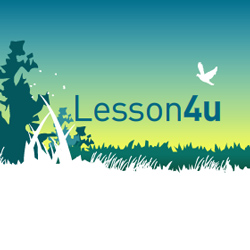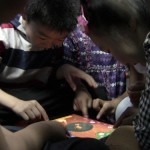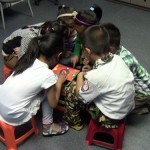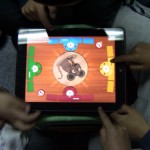Summercore Executive Raves About Futaba
INKids Education spoke with tech integration specialist, Steve Bergen, about his use of Futaba Classroom Games and this is what he had to say:
I am the co-director of Summercore Inc, a nationally known training and consulting company for teachers. We have had over 3,000 teachers attend our workshops from over 400 independent schools since we began in 1982. I have also been the CIO & Director of Technology at The Chapin School and The Children’s Storefront in Manhattan.
I’ve been recommending Futaba Classroom Games since the summer of 2013 when I came across it and teachers tell me they enjoy the innovative nature of having an enjoyable competition with 1-3 other people.
One of our teachers mentioned that she also thought Futaba CG was “a great app for small group work” and thought one of the best features was being able customize the games for various academic and age levels. Other teacher’s were so impressed that they started playing it with their partners after the conference…
We have shown Futaba Classroom to many teachers and it always gets a positive reaction. In the Summercore Homework Journal that we hand out a teacher wrote her thoughts on Futaba: “There were many parts of the program that I liked including the multiplayer capabilities so I purchased the Classroom Edition. I feel I will be able to use this program with my kindergarten students.”
We’d like to thank Steve for sharing his thoughts and feedback with us!
How one Inner Mongolian primary school is using iPads to teach ESL
 Every now and then we get some customer feedback from some of our users which is a thousand times better than a “good day in the app store”. Joshua Allen, a teacher from Inner Mongolia at an international school called English First (EF) recently contacted us with exciting feedback about our apps, and graciously agreed to be interviewed about the impact of our applications on his teaching methods and his students. The pictures Josh sent us lit up our day – we’ve never actually seen a classroom full of kids using Futaba Classroom Games…
Every now and then we get some customer feedback from some of our users which is a thousand times better than a “good day in the app store”. Joshua Allen, a teacher from Inner Mongolia at an international school called English First (EF) recently contacted us with exciting feedback about our apps, and graciously agreed to be interviewed about the impact of our applications on his teaching methods and his students. The pictures Josh sent us lit up our day – we’ve never actually seen a classroom full of kids using Futaba Classroom Games…
Where are you originally from and how did you come to be a language teacher in Inner Mongolia?
I grew up in Connecticut, had a short stint as a musician in LA, helped build an online leads company with some friends, and then I decided it was time to see some other parts of the world. I saw a TEFL (Teaching English as a Foreign Language) course in Prague, Czech Republic online one day and said to myself, “You know, this is one of those things everyone thinks about doing someday but never does. I’m gonna do it.” I went to Prague, got my teaching certificate and looked at some options on where to teach that would be far off the beaten path. Here I am in Inner Mongolia, China.
What age groups are you teaching and how have you integrated our applications into your curriculum?
I teach children from 3 years all the way up to adults. We have a prescribed curriculum here, but while we are expected to teach certain things, we have the freedom of teaching using many different methods. As I’m sure many teachers of children know, you have to keep it fresh. Attention spans are everywhere so what I usually do is play lots of games and work in certain sentence structures and then offer up the Classroom Games (CG) app towards the end of our class as the sort of “cherry on top.” I generally use Futaba Classroom Games every few classes so as to keep it exciting. I also use the Flashcard Games app to elicit the alphabet, animals, numbers, colors, and body parts. They really love coming up to touch the screen and hear the dog bark.
 How did you come about using Futaba Classroom Games and how did your class react to it?
How did you come about using Futaba Classroom Games and how did your class react to it?
I was given an iPad as present and I started to try and find some ways to integrate it into my teaching. I started with having my kids come up and write letters on a whiteboard type app, but I knew there was more potential there, so I downloaded two-dozen apps but deleted about one dozen after trying them out. Some of them just had poor interfaces and design, but the real challenge for teachers is that having one student come up to an iPad leaves so many other students unoccupied and that’s a serious challenge. When I found your Futuba game, I said, “YES, four kids occupied at one time!” When I tried it out with my 6 year olds, they went absolutely crazy. They loved it. Because I wasn’t sure what to expect I wasn’t prepared for the kids huddled around, each of them trying to touch everything. The second time I set some rules and they have been very good and so well behaved every time since then.
What kind of custom content have you created for your class?
As previously mentioned, our school has a fairly strict curriculum. The great thing is that they provide us with high quality flash cards that I can play games with. When I demoed the Classroom Games app and saw how amazingly simple it was to add my own content I bought the app. Each unit I introduce about 8-12 new vocabulary words. So I took all our flash cards and used the in-app camera to take pictures of them and then typed in the vocabulary and voila! In about five minutes I had my whole unit set up. I do this with each new unit I start.
What are the strong points of using (our) iPad applications in the classroom environment?
• Provides excitement and sparks interest.
• It’s a platform that kids are already familiar with – kids know computers; why not use them more in education?
• Endless possibilities – you can always update the apps and make them even better – not so with their books that they spent a fortune on.
The reason I actually bought Classroom Games was because of the excellent design (that means a lot to me). Additionally, forgive me for using an overused word, but the interface is so intuitive. Call it what you want; instinctive, visceral, natural. It took my six year olds all of one second to figure out that “Tap here to start game” was what they should touch. They don’t know what “tap here” means, but they knew exactly what to do without me teaching them. I’ve also had some great results with the Flashcard Games app, which allows the kids to interact with the flash card and keep them interested. I also use the Flashcard Games app when placement testing new students and that provides them with a more relaxed environment so they don’t focus so much on how nervous they are in trying to speak well. These types of applications paired with great equipment are the natural next step in the education system. I hope governments around the world will see the value of these types of interfaces and how it keeps kids interested and will decide to invest more money into getting them into schools and in the hands of the students.
Have you seen any direct outcomes from using iPads in the classroom?
The direct result for my kids is an increase in desire to learn. I teach them using so many different methods that it’s hard to say which one has the best result on their learning, but I do know that if I could put an iPad in every kids hand armed with your app and other great education apps, I would in a heartbeat. I have only one to work with and the kids are really excited about learning. They want to have fun, why not provide them with an educational environment that is fun? I’m not sure what statistics there are out there, but I would put my money on a fun environment provides a better learning experience. If you’re reading this, you’ve got an iPad and you’re probably a teacher or parent/teacher. My Chinese students have learned a bunch of vocabulary – I teach them using many different methods, but this is one method which keeps them focused and involved, and I highly recommend both Classroom Games and Flashcard Games.
.
INKids Teacher Showcase: Deborah Komatsu SLP

Deborah Komatsu SLP
We often receive feedback from our user base and we appreciate every email we get… when practical we use feedback and suggestions from our users to improve our products. Deborah Komatsu, a Speech Pathologist for Los Angeles Unified School District contacted us with incredibly valuable feedback about our apps, and allowed us to interview her about how she uses iPads for the betterment of her students.
What’s your occupation and how long have you been involved in it?
I am a speech pathologist at an elementary school at Los Angeles Unified School District. This is my first year as a teacher. My first career was as a film editor, which I enjoyed; however, after having my son, I decided to find a more family-friendly career. I studied early education and then speech pathology, getting my Masters in Communication Disorders in May 2012. I enjoy working with children and am always looking for low- and high-tech opportunities for learning!
What ages do you work with and what are the challenges of being an SLP?
I work with children from 3-10. My school has a large Spanish-speaking immigrant population; this makes it trickier to determine a language disorder versus a difference. It’s also more difficult to communicate with parents! Because of the language barrier, I create a lot of picture cards that don’t require reading; I like to customize my cards to represent the Latino and African American population I work with. There is also a lot of poverty in the neighborhood where I work. It’s a challenge to get parents involved and have them share in literacy activities at home.
What technologies are you using in your learning environment? Which are most effective?
The students I work with are all attracted to working with the iPad. They like games where they get to compete against each other. If the app is customizable, I can tailor the images to encourage the responses I want.
Are you using any other INKids applications, if so, how so?
I have Kids Flashcard Maker and Kids Flashcards for iPad and Futaba. I’ve used the Flashcards for iPad app when I just need some novel images for children to respond to. I haven’t found a use for Flashcards Maker yet; Futaba serves the same function and is more fun because it’s a game.
Tell us about the iPad implementation you work with. How does Futaba Classroom benefit speech development and how are you using it to the benefit of your students?
I work with small groups – usually 4:1 or less. I use the app for both speech (making game sets based on target sounds – “boy”, “bag”, “bat”) and for language (“Use the picture in a full sentence” or “describe what you see”).
What other ways do you use the iPad?
In addition to Speech and Language activities, I use the app for Fluency, Voice, AAC (Augmentative and Alternative Communication). I also use various app as Speech Pathology tools, such as apps to record language samples and calculate age.
Can you recommend any other applications for educators, parents or those involved in language pathology?
Here are some apps I have found to be very handy for my work as a speech-language pathologist:
Action Words (free) – lots of action verbs for making sentences
Little Stars – Toddler Games (free) – customizable competitive play
Sort it Out 1 ($1.99 for full version) – match and and discuss relationships
Comparative Adjectives (free)
Memory King (free) – matching game, add your own images
Guess ‘Em (free) – pay $1.99 for the “Studio Version” so you can make your own Guess Who games
My First 1,000 Words – Flashcards and Games by Aligator Apps ($1.99) – lots of images!
Preschool EduKitty-Fun Educational Game ($1.99) – lots of fun early concept games
Receptive Language Assessment ($24.99) – find strengths and weaknesses in receptive language
Splingo’s Language Universe ($2.99) – great game for working on receptive language
Toontastic (free) – great template for creating and narrating stories
Thanks very much for taking the time to answer our questions. We’re really glad that you’re having a positive experience with our applications and so many others! It is an exciting time to be in education and we want to enable you to best meet the needs of your students.

.
Strahan Winchester – Napier Girls’ High
Recently, we briefly spoke with Strahan Winchester who has been teaching at Napier Girls’ High School in New Zealand for 3 years. Strahan is a self professed tech enthusiast and has integrated technology into his language classrooms by using our apps. Teaching students in grades 9, 10, and 11 he has just a single iPad but that doesn’t stop him from embracing technology to engage his students.
“I use Futaba to support vocabulary learning. I can introduce vocabulary to students but I can’t do the memorising for them. Futaba is a tool that the students enjoy using. It is a great revision tool. I also use it as a carrot to keep students engaged. When students finish their work for the lesson they get to choose an activity to do, and Futaba is high on that list. I like the fact that students get instant feedback on the correct answer.”
Strahan also mentioned that the fun and competitive nature of Futaba keeps students coming back to play again and again. Four player games are rare for learning game apps and Futaba aims to immediately engage students in competitive and even collaborative review sessions.
Out of the box Futaba is indeed a competitive review game for up to 4 players with one player becoming the champion but alternatively, teachers can have their students engage in collaborative play by using the Practice Mode. In this race against the clock, any number of students sit in a circle where the first student answers the question presented and then quickly slides to next player who in turn does the same. Using this method, total game time for a group usually lasts about 3-5 minutes and is recommended for small groups of up to 5 students. Seeing how fast the group can complete the game playlist is lots of fun for the students and gives them a target to collectively beat for the next lesson. Its a cooperative play on Futaba that works really well in classes where everyone is the winner and there are no losers.
Thanks very much for taking the time to chat with us Strahan. We wish you and your students at Napier Girls’ High many more fun-filled days ahead using Futaba to grow your knowledge!
Lesson4u Language School
Lesson4u is private language school in Kanazawa City, Japan that teaches both English and French . Hosting about 800 students, mostly kids, they have integrated daily use of Futaba Classroom Games to help their students get a handle on essential vocabulary they use during their language studies. Tony Bannister, the director of Lesson4u, took some time out of his schedule to fill us in on how he has successfully integrated Futaba.
“At the moment our school uses English Time 1, Let’s Go 1, and we’ve been working through the related flashcards, taking pictures and putting them into Futaba via the onboard content creator. It works GREAT and really ties in the textbook vocabulary with classroom games.”
Tony also has come up with some innovative ways to engage young students who are just beginning to learn how to read:
“I’ve also created a phonics section too for the even younger kids. I tried it recently with a three year old with epic results! I created a single picture of some ABC blocks that doesn’t change throughout the game but my voice comes up before the display of the blocks and gives the students the phonetic sound of a letter. They have to choose the correct letter being enunciated. Again, it works so well it’s unbelievable. My staff has also added a section for “this, that, these those” where there’s a picture of someone holding something close (etc), no sound and my students must chose the correct option; a perfect example of a section of English which the kids find confusing so don’t really concentrate on getting it nailed down. This forces them to do so like no other game we’ve found.”
Classes at Lesson4u also engage in collaborative play where up to 6 students are split into groups of 3 on each side of a table. The teacher sits at the head and pushes the iPad down so the play team on team in rotation to get the best time.
“The applications for Futaba are endless and it’s causing a huge stir amongst Lesson4u kids and their parents. My congratulations on a fantastic product.”
We’d like to thank Tony for taking the time out and letting us know how Futaba Classroom is being used to augment language lessons at his school. Its really great to see specific examples of how Futaba can be used to assist in acquisition of language phonics, vocabulary and grammar!









